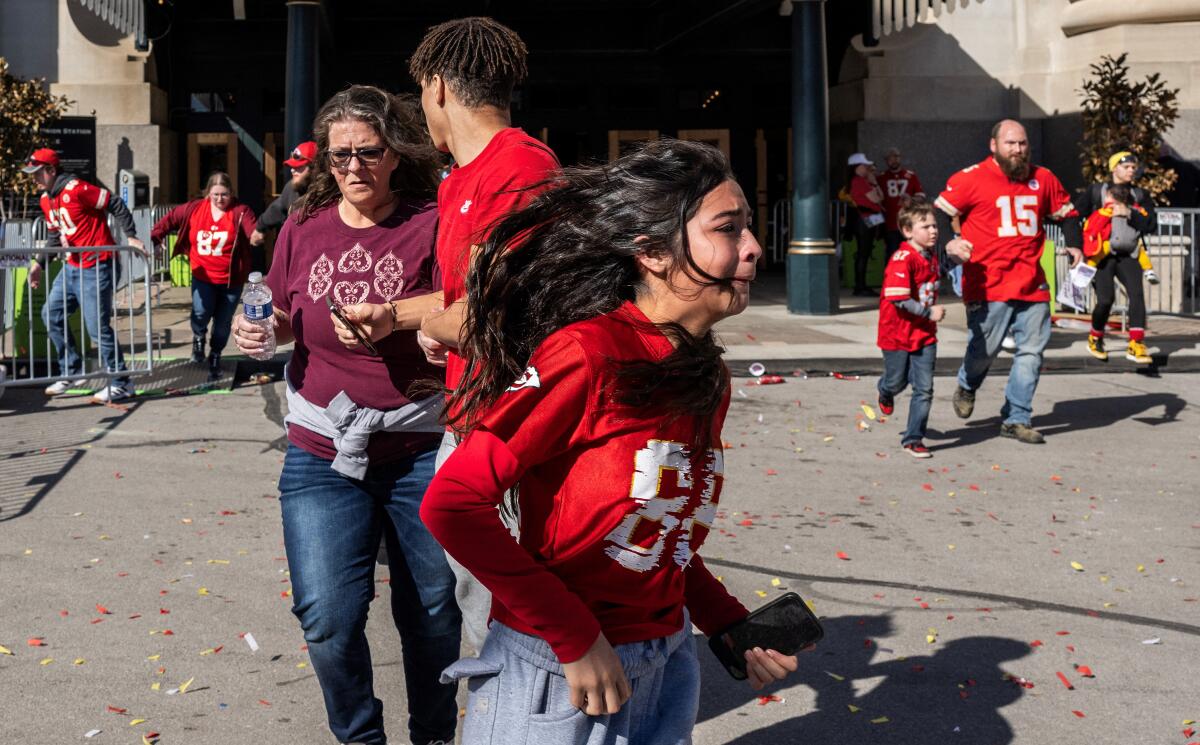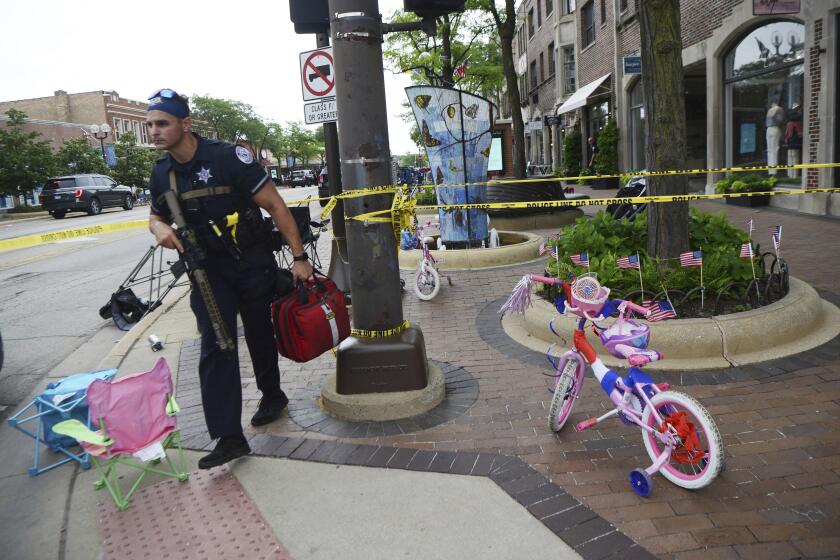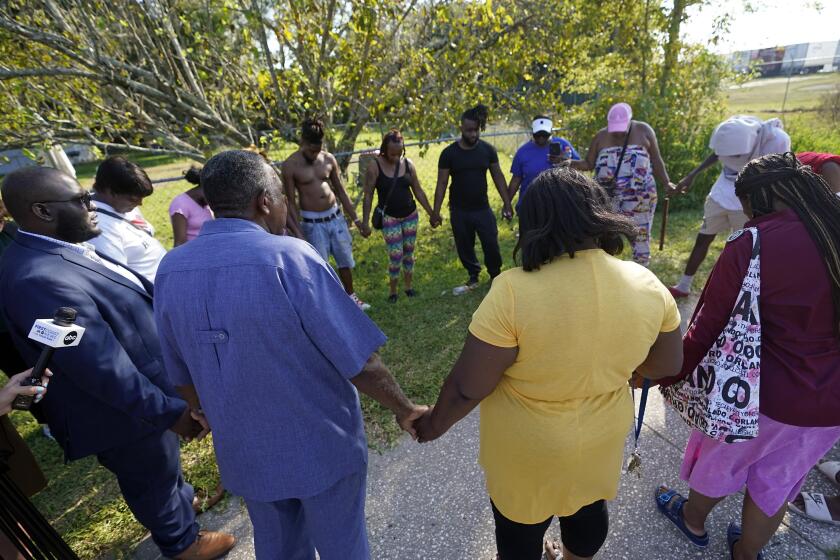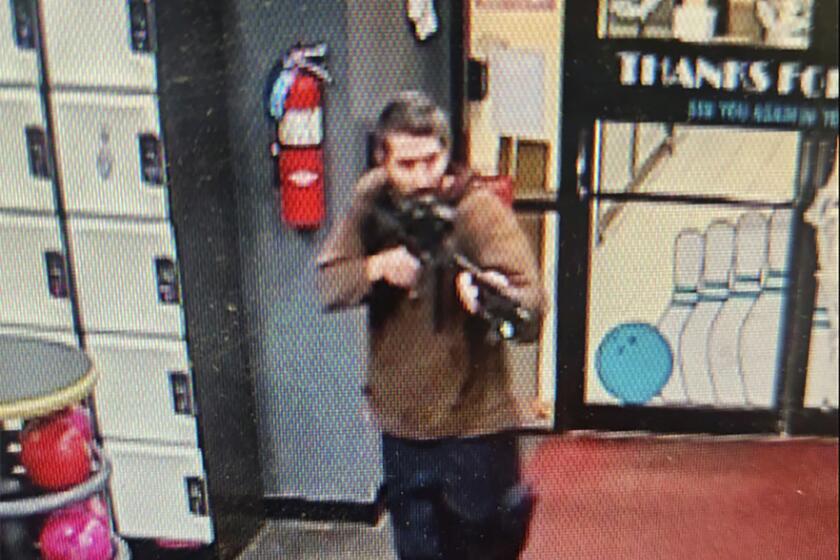Editorial: Kansas City Super Bowl parade shooting is the nation’s new brand of terror

- Share via
By one widely accepted definition, the gunfire that killed one person, wounded 22 others and ruined the Kansas City Chiefs’ Super Bowl victory celebration on Wednesday does not qualify as a “mass shooting.” Not enough people died.
So common is random gun violence in the United States that we must distinguish between those shootings that were merely deadly and those in which four or more people lost their lives. Let’s hope that the wounded recover, and the Kansas City killing can continue to be classified among the merely mundane, everyday horrors that are now incorporated into the American way of life.
Shooting deaths in places once reserved for celebration are now as American as apple pie and Fourth-of-July parades
But that classification doesn’t do justice to this ever more frequent American phenomenon in which gunfire turns the joy of celebrants into terror.
Initial reports suggest that a private dispute, and not politics or ideology, led to the gunfire in Kansas City, so it was not an act of terrorism by the common definition that makes us think of hijacked airplanes and the 9/11 attacks. It appears to have had no political motivation of the sort that led to the 2015 Christmas party massacre by homegrown Islamic extremists in San Bernardino, or the white supremacist slaughters of Black people in a Charleston, S.C., church in 2015, a Buffalo, N.Y., supermarket in 2022, a Dollar General store in Jacksonville, Fla., in 2023, and countless other shootings in which people were targeted for their race, religion or politics.
This country is exactly the place for hateful, murderous, suicidal gun violence, because this is the place for millions upon millions of guns and the bizarre American delusion that the more of them we have, the safer and freer we are.
It may be more akin to incidents like the one in Orange County last year in which a man tried to gun down his estranged wife at a local bar and ended up shooting eight others, three of them fatally. Or any number of incidents in which an armed person at a party, a baby shower, a wedding or any other celebration felt entitled to settle scores with deadly violence.
Regardless of the motivation, though, the result is terror, as the word is generally understood. The terrorist wields violence and fear, and undermines people’s self-confidence and sense of security. What is it, if not terror, that the ever-present threat of gun violence makes Americans think twice before gathering in public places to share our pride and pleasure in football teams, parades, music, freedom or each other?
The suspect in the mass shooting in Lewiston is said to be a military reservist with a history of mental issues. He’s no more or less typical than other U.S. mass shooters.
It makes little difference in the moment to those running for their lives whether the perpetrator was motivated by ideology, personal grievance or self-obsession. Gun violence turns places of sanctuary and celebration — schools, churches, synagogues, dance clubs, Super Bowl victory parades — into targets. People who so grievously misuse their gun rights are terrorists.
It’s a peculiarly American twist that we politicize even the perception of this kind of terror. Democrats focus on mass shootings and rail against Republicans for defending easy access to the guns that make them possible. Republicans double down on street crime and criticize Democrats for supposedly being too soft on the shooters. But all gun violence — even now, as homicide rates plummet — inflicts terror. The foreign agents and domestic white supremacists who want to destroy the United States are achieving their goal. Or, rather, American gun policy, and Americans with guns, are achieving it for them.
More to Read
A cure for the common opinion
Get thought-provoking perspectives with our weekly newsletter.
You may occasionally receive promotional content from the Los Angeles Times.













